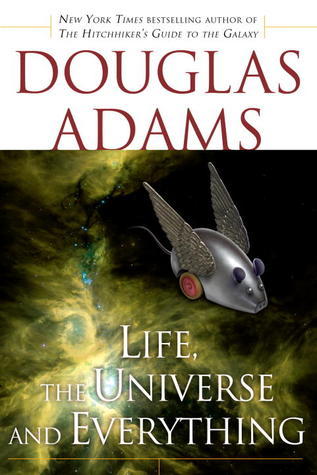What do you think?
Rate this book


224 pages, Paperback
First published August 1, 1982
┘łž¦┘łž©ž¦┌»ž▒ ž┤ž▒┘łž╣ ┌®ž▒ž» ž©┘ć ┘ģž¬┘å┘üž▒ ž┤ž»┘å ž¦ž▓ ž¼┘枦┘å ž»ž▒ ┌®┘äžī ┘ł ┘ģž«žĄ┘łžĄž¦┘ŗ ┘ģž¬┘å┘üž▒ ž┤ž»┘å ž¦ž▓ ┘ć┘ģ█Ć ┘ģž▒ž»┘ģ┘É ž│ž¦┌®┘å ž¼┘枦┘å
ž»ž▒ ┘ć┘ģ█ī┘å žŁž¦┘ä ┘ł ┘ć┘łž¦ ž©┘łž» ┌®┘ć ┘ćž»┘üž┤ ž▒┘ł ┘Š█īž»ž¦ ┌®ž▒ž». ┘ćž»┘ü█ī ┌®┘ć ┘ģ█īŌĆīž¬┘ł┘åž│ž� ž¦┘ł┘å ž▒┘ł ž│ž▒┘Šž¦ ┘å┌»┘ć ž»ž¦ž▒┘ćžø ž¬ž¦ ž¦ž©ž» ž│ž▒┘Šž¦ ┘å┌»┘ć ž»ž¦ž▒┘ć. ┘ćž»┘üž┤ ž¦█ī┘å ž©┘łž»: ┘łž¦┘łž©ž¦┌»ž▒ ž¬žĄ┘ģ█ī┘ģ ┌»ž▒┘üž¬┘ć ž©┘łž» ┌®┘ć ž©┘ć ž¼┘枦┘å ž¬┘ł┘ć█ī┘å ┌®┘å┘ć. █īž╣┘å█ī ž©┘枬ž▒┘ć ž©┌»█ī┘ģ ž©┘ć ┘ć┘ģ█Ć ┘ģž▒ž»┘ģ┘É ž¼┘枦┘å ž¬┘ł┘ć█ī┘å ┌®┘å┘ć. ž©┘ć ž¬┌®ŌĆīž¬┌� ž│ž¦┌®┘垦┘å ┘ć┘ģ█Ć ┌®┘ć┌®ž┤ž¦┘åŌĆī┘ćž�. ž┤ž«žĄž¦┘ŗ ┘ł žŁžČ┘łž▒ž¦┘ŗ. █ī┌®█ī ┘Šž│ ž¦ž▓ ž»█ī┌»ž▒█ī

Is there ... any experiment that could distinguish between ... the MWI and the Copenhagen interpretation using currently available technology? The author can only think of one: a form of quantum suicide in a spirit similar to so-called quantum roulette. It requires quite a dedicated experimentalist, since it is amounts to an iterated and faster version of Schr├Čdinger's cat experiment with you as the cat.But is Tegmark really correct in saying that the experimenter would not convince anyone else of the correctness of the MWI? Imagine that you are the assistant in the universe where the experimenter succeeds in cheating death 100 times in a row, after having explained what she is about to do. I, at least, would find this convincing. I wouldn't be able to repeat the experiment (only the person risking their life can do that), but it would still seem way too strange to ascribe to pure chance.
The apparatus is a "quantum gun" which each time its trigger is pulled measures the z-spin of a particle. It is connected to a machine gun that fires a single bullet if the result is "down" and merely makes an audible click if the result is "up". The details of the trigger mechanism are irrelevant (an experiment with photons and a half-silvered mirror would probably be cheaper to implement) as long as the timescale between the quantum bit generation and the actual firing is much shorter than that characteristic of human perception, say 0.01 seconds. The experimenter first places a sand bag in front of the gun and tells her assistant to pull the trigger ten times. [Everyone] agrees that the "shut-up-and-calculate" prescription applies here, and predict that she will hear a seemingly random sequence of shots and duds such as "bang-click-bang-bang-bang-click-clickbang-click-click." She now instructs her assistant to pull the trigger ten more times and places her head in front of the gun barrel. This time the shut-up-and-calculate recipe is inapplicable, since probabilities have no meaning for an observer in the dead state, and the contenders will differ in their predictions. In interpretations where there is an explicit non-unitary collapse, she will be either dead or alive after the first trigger event, so she should expect to perceive perhaps a click or two (if she is moderately lucky), then "game over", nothing at all.
In the MWI, on the other hand, the state after the first trigger event is [...] Since there is exactly one observer having perceptions both before and after the trigger event, and since it occurred too fast to notice, the MWI prediction is that [the experimenter] will hear "click" with 100% certainty. When her assistant has completed his unenviable assignment, she will have heard ten clicks, and concluded that collapse interpretations of quantum mechanics are ruled out at a confidence level of 99.9%. If she wants to rule them out at "ten sigma", she need merely increase n by continuing the experiment a while longer. Occasionally, to verify that the apparatus is working, she can move her head away from the gun and suddenly hear it going off intermittently.
Note, however, that almost all terms in the final superposition will have her assistant perceiving that he has killed his boss. Many physicists would undoubtedly rejoice if an omniscient genie appeared at their death bed, and as a reward for life-long curiosity granted them the answer to a physics question of their choice. But would they be as happy if the genie forbade them from telling anybody else? Perhaps the greatest irony of quantum mechanics is that if the MWI is correct, then the situation is quite analogous if, once you feel ready to die, you repeatedly attempt quantum suicide: you will experimentally convince yourself that the MWI is correct, but you can never convince anyone else!

